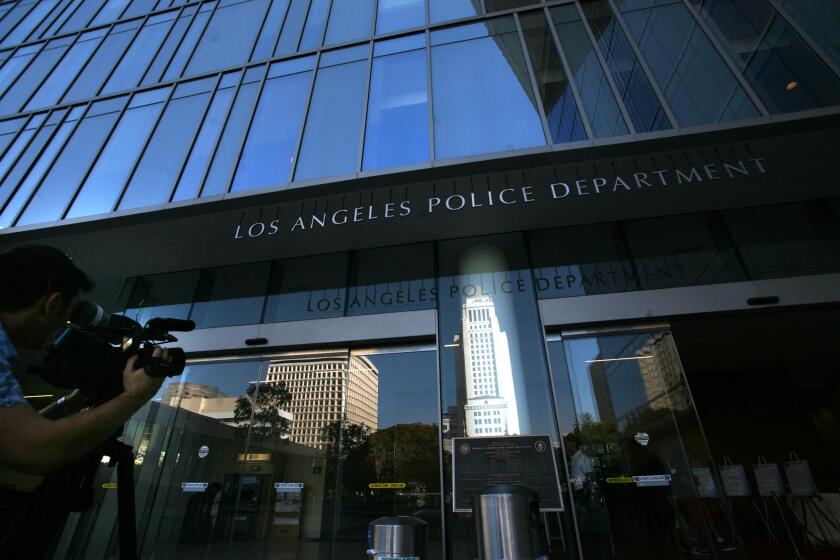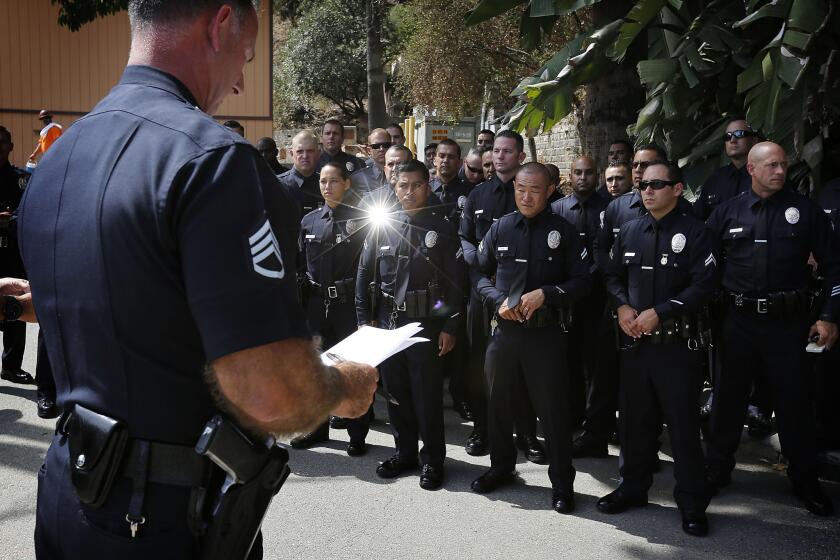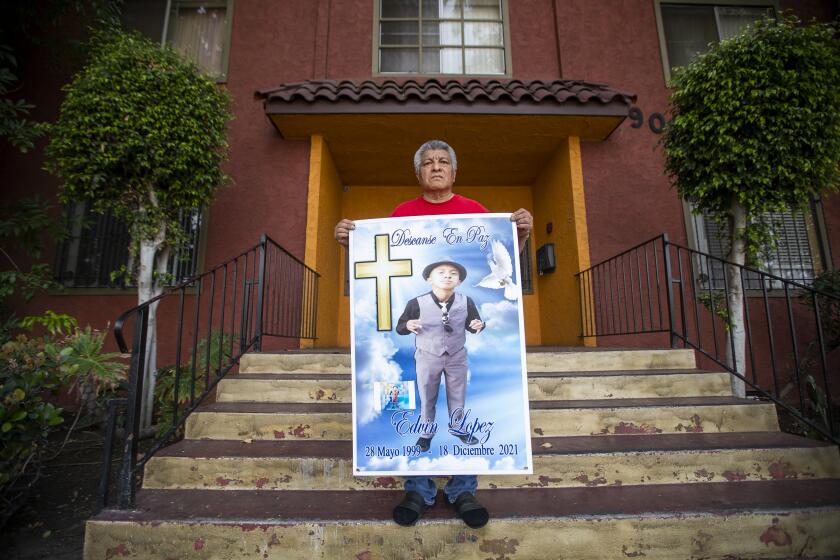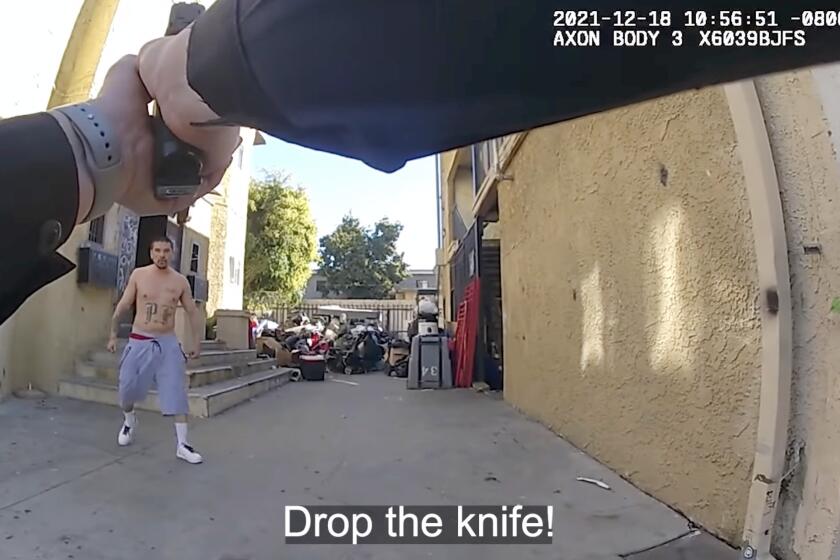Cases against LAPD officers accused of making false gang claims fall apart

- Share via
When Los Angeles police officers were accused two years ago of deliberately misidentifying people as gang members, the fallout was swift and sweeping.
Six officers were charged with crimes and police officials opened investigations into two dozen more, seriously tarnishing the reputation of the LAPD’s vaunted Metropolitan Division. Prosecutors also dismissed felony cases that had relied on testimony from the charged officers, while then-California Atty. Gen. Xavier Becerra barred police across the state from using any of the thousands of records LAPD officers had entered about alleged gang members in the CalGang database.
In the years since, however, the case has largely fallen apart.
Charges against three officers have been tossed out, while prosecutors have decided there isn’t enough evidence to bring cases against the other officers suspected of possible wrongdoing. And the L.A. district attorney’s office is now reconsidering whether to press ahead with the charges that prosecutors filed in the few cases that remain active, according to district attorney’s records reviewed by The Times.
The scandal erupted when officers were accused of falsifying field note cards LAPD officers commonly fill out after speaking with people during traffic stops, arrests or other encounters. On the cards, officers can identify a person as belonging to or associating with a certain street gang, and, prior to the scandal, the information was entered into the state database, which officers in all California police departments can access.
Three more LAPD officers are charged with falsifying information about gang membership, bringing the total number of officers charged in the scandal to six.
Activists have long denounced the LAPD for allegedly misidentifying people as gang members, a label they say can follow people through life and negatively affect their ability to work and secure housing. The LAPD launched its investigation of the Metro officers’ practices after a Van Nuys mother complained about her young son being mislabeled a gang member in 2018. Critics say the problem persists.
The allegations of dishonesty have crumbled largely as blame for the problem has shifted away from the individual officers and landed instead on the LAPD’s former policies for identifying gang members.
The most recent setback in the case came last month when prosecutors decided they did not have sufficient evidence to file charges against six LAPD officers — a move that brought the total number of officers who prosecutors have declined to charge to 25, according to the district attorney’s records.
The decision was based in large part on a ruling in February by Los Angeles County Superior Court Judge Michael Pastor, when he dismissed charges that prosecutors had filed against three other Metro officers: Rene Braga, Julio Garcia and Raul Uribe.
Prosecutors have begun dismissing felony cases that relied on the work of LAPD officers charged with falsifying records by claiming without evidence people they stopped were gang members.
Prosecutors argued during a preliminary hearing that the three officers were guilty of falsifying evidence because they had written on field cards that people they stopped were “self-admitted” gang members despite the fact that videos of the encounters recorded no such admissions.
Pastor disagreed, finding the LAPD had no clear definition of what it meant for someone to have self-admitted gang membership. Based in part on the testimony of a higher-ranking LAPD commander, he concluded that under LAPD policies, an officer could use not only information they gathered from speaking with people, but also their own understanding of gang behavior and tattoos to determine someone had admitted to being in a gang.
Any “dereliction” in the case, therefore, did not lie with the officers, Pastor concluded, but “higher up in the command structure, perhaps to the highest levels.”
After that ruling, prosecutors decided not to bring charges against the six officers in the recent case. They wrote in court filings there was evidence showing Metropolitan Division supervisors “taught and condoned” the practice of officers relying on information not included on interview cards or recorded on video to identify people as gang members.
An LAPD officer charged with falsifying records and obstructing justice was allowed to work in an elite division even though questions were raised about his credibility five years ago.
“The officers were encouraged to use their experience about their observations in the field, render opinions about gang membership, and were allowed a broad view of the terms ‘admit,’ ‘self-admit,’ and ‘S/A’ to include verbal and non-verbal admissions,” prosecutors wrote.
The LAPD did not respond to a request for comment, but the department has previously acknowledged its policy for filling out field interview cards gave officers too much leeway when determining if someone is a gang member.
The department revised its policy in September 2021, instructing that officers “shall not document opinions, including an opinion that the person is a member or affiliate of a gang, unless they indicate the specific and articulable facts upon which they base that conclusion.”
The district attorney’s recent decision not to charge the officers followed another one last year in which prosecutors rejected bringing cases against an additional 19 officers who had come under investigation. Those officers, prosecutors concluded, had been present when other officers were said to have provided false information on field interview cards, but were unaware of the alleged misconduct.
In recent shootings, LAPD officers have repeatedly fired live rounds and ‘less lethal’ alternatives simultaneously, without allowing the less-lethal rounds to take effect first.
“They either had no participation in the preparation of the [field interview] cards at all or, if they did, the information they provided was accurate,” prosecutors wrote. “There is no evidence that they aided and abetted their fellow officers’ misconduct.”
Braga, Garcia and Uribe, the three officers Pastor cleared of wrongdoing, are all now suing the city and the LAPD, alleging that LAPD commanders targeted and demoted them in order to send “a clear message” that officers should “not talk about how Metro operates” to Times reporters or others.
And two of the six officers who prosecutors recently declined to charge, Samantha Fiedler and Mario Fernandez, have also sued the city and the LAPD. They allege commanders for years enforced a de facto quota system, pressuring officers to hit targets for the number of alleged gang members they identified and arrested. Officers who didn’t meet the targets were punished and then were scapegoated when the mislabeling scandal broke, the officers allege.
The officers’ lawsuits are pending.
Los Angeles police officers are required to tend to people they shoot. However, videos from recent shootings show crucial minutes often pass before they give medical attention, and sometimes officers do nothing at all.
Of 31 officers implicated in the scandal, only the fates of Braxton Shaw, Michael Coblentz and Nicolas Martinez, the first three to be charged, remain undecided.
Shaw, who has been shadowed for years by questions surrounding his credibility, stands accused of falsifying 43 interview cards, while Coblentz allegedly falsified seven people’s cards and Martinez two. Prosecutors allege the officers each wrote on cards that people admitted to being gang members when body-camera footage showed either no such admissions or that people had explicitly denied gang affiliation.
Unlike the officers who have been cleared in the case, Shaw, Coblentz and Martinez also stand accused of making up and filing field cards on fictional gang members.
The case against the officers has a hearing scheduled for June. But, now, the charges against them are “under further evaluation” in light of the evidence in the case Pastor dismissed, according to a memo by a prosecutor in the district attorney’s Justice System Integrity Division, which considers alleged criminality by law enforcement.
A spokesman for Dist. Atty. George Gascón declined to comment beyond what was in the records reviewed by The Times.
Greg Yacoubian, an attorney for Shaw, said all of the charges in the case should be dropped.
Yacoubian said Pastor’s finding that officers were instructed to use their understanding of gangs when making a decision on whether someone belonged to one “implies that the same holds true” for other officers — including Shaw.
Also relevant to Shaw’s case, he said, were Pastor’s findings that there was a broad definition for “self-admitted” that was used by LAPD officers at the time, and that responsibility for misuse of the cards lied higher up in the department, not with individual officers.
An attorney for Coblentz declined to comment. An attorney for Martinez did not respond to a request for comment.
More to Read
Sign up for Essential California
The most important California stories and recommendations in your inbox every morning.
You may occasionally receive promotional content from the Los Angeles Times.


















